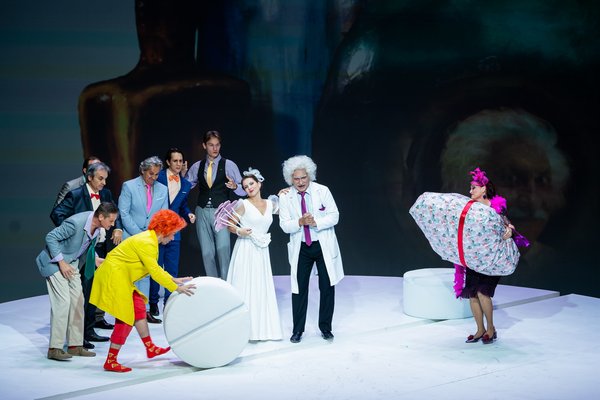
IL CAMPANELLO – Lázár Ervin Programme, MVM Piccolo Programme
20 September 2024, 1 p.m.
In Brief
Comic opera in one act, in Hungarian, with Hungarian surtitles
Details
- Location
- Eiffel Art Studios – Miklós Bánffy Stage
- Date
- Sept. 20, 2024
- Start time
- 1 p.m.
- End time
- 2 p.m.
Synopsis
Neapolitan chemist Don Annibale is being wed to the lovely Serafina, but he needs to hurry through the nuptials, since he has to wake up at dawn in order to head for Rome in an important matter. Enrico, Serafina's previous lover, resolves that he will win the woman back. He delivers a toast to the newly-weds, and then departs with the rest of the wedding guests. Dressed in a nightgown and nightcap, Annibale is getting ready to fulfil his conjugal duties, when someone rings the bell in the chemist's shop. It's the disguised Enrico passing himself off as a French dandy who needs wine to medicate his stomach, which he has overtaxed at the ball. While Annibale fetches the wine, Enrico rearranges all the furniture and turns off the lights. Just when the chemist, with great difficulty, has almost found his way back to bed, the bell rings again. It's Enrico again: this time he's disguised as a singer who has to perform the next day, except he's lost his voice. The medicine restores his voice, and he sets about practising his role in the chemist's shop. When the "singer" finally departs, Annibale receives a message warning him that some kind of terrible act of vengeance is going to take place. The apothecary takes the warning serious, and instructs his servant Spiridione to set up a makeshift trap. The bell rings again – Enrico, now dressed as an old man, produces a long list of medicines needed to treat his "wife's" snivelling. At last, Annibale shows the inopportune visitor the door and is about to rush to his wife's side when he stumbles into the trap that has been set. The bell rings again. It's Enrico again, now without a disguise: he smugly reminds the chemist that it's time for him to leave for Rome. Annibale is forced to postpone his wedding night and departs for the capital. Enrico promises to substitute for him while he's gone...
Gallery
Reviews
"The story of this opera also appeals to young audiences, and the creators didn't even leave chance to chance."
Emese Lengyel, Magyar Nemzet
